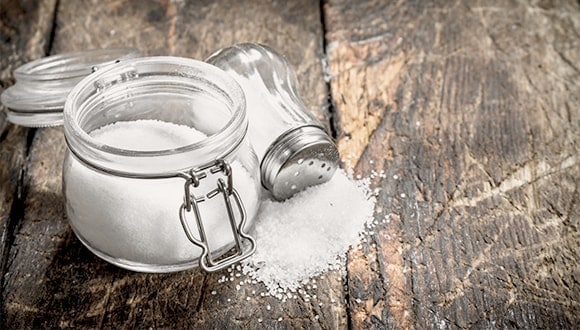Are you eating too much salt?
Although salt packs a flavour punch, too much of it can be bad for your health.
Health Agenda magazine
July 2018
Do you love an instant meal, pre-made sauces or junk food? You may be eating too much salt and unaware of it. You’re not alone: many Australian adults exceed the recommended maximum of 6 grams, or 1 teaspoon, of salt a day. And our tastebuds become desensitised to it, so we just want more.
A report published in the Medical Journal of Australia found that not only are Australians overdoing the salt, we’re also unaware of how much we’re eating. On average, men consume about 10 grams of salt a day and women more than 7 grams a day.

What is salt, and how does our body use it?
“We need salt to balance the fluid in our body and to help muscles and nerves function correctly,” says accredited practising dietitian Gabrielle Maston.
Salt is made up of sodium and chloride, and it’s the sodium in salt that can be bad for your health. If you regularly consume too much you can increase your risk of high blood pressure, which is a major cause of heart disease. It’s estimated that globally around 1.65 million deaths from heart disease are attributed to high salt intake each year.
How to cut down on salt
If you need to cut back, you can start when you’re planning meals and shopping – 75% of our salt comes from processed foods, like bread, processed meat and cooking sauces.
Try to avoid:
- packaged snack foods like chips and crackers
- white bread
- muffins, pies and pastries
- processed meats like ham, bacon and salami
- salty cheese such as haloumi, feta and blue cheese (and keep in mind that different brands of cheese may have different amounts of salt)
- ready-made or packaged sauces like tomato, soy and pasta sauces.
Steer your trolley away from the aisles filled with packaged and processed foods and head to the fresh fruit, vegetables and unpackaged foods. Low-salt options include:
- fruit and vegetables
- whole grains such as brown rice, quinoa and oats
- proteins like seafood, lean meat, poultry and legumes
- unsalted nuts and seeds.
Check food labels carefully
Check the labels of the packaged foods you buy and try to avoid products with more than 400mg of sodium per 100g serving. If you have high blood pressure look for products with less than 120mg of sodium per 100g. You also need to be smart about products labelled ‘salt-reduced’ and ‘no added salt’.
“Salt-reduced products still contain salt, but less than the original product,” explains Maston. Products with no added salt can be misleading.
“They may be naturally salted anyway,” says Maston. “For instance, a frozen meal may not have added salt, but instead has soy sauce in the ingredient list, which is really high in salt. A teaspoon of soy sauce contains almost 2-3 grams of salt.”
Eating out
If you’re dining out, avoid fast food as it could have more than your entire day’s recommended intake in one hit. Opt for freshly prepared food and keep an eye on your serving sizes – if you’ve ordered more than you would normally eat at home, don’t be shy in asking for the rest to take away.
Adding flavour at home
Cutting down on salt doesn’t mean you have to eat bland meals. There are plenty of natural alternatives that will add flavour to your cooking. Try herbs and spices, garlic, onion, leeks and lemon.
Related Articles
WHAT ARE WHOLE FOODS?
In a world of trending diets and food fads, don’t forget the benefits of simply eating whole foods, says dietician Dr Tim Crowe.
CAN AN EFFICIENT METABOLISM HELP YOU LOSE WEIGHT?
What does a fast or slow metabolism actually mean? Here’s what you need to know about this essential bodily function.
IS IT HARDER TO LOSE WEIGHT WHEN YOU’RE OLDER?
With a few lifestyle changes, maintaining a healthy weight doesn’t have to be hard as you age, says dietitian and exercise physiologist Caitlin Reid.
THE FACTS ABOUT SUGAR
Sugar has been getting a bad rap lately. Is it really that bad? How much is ok? We look beyond the headlines to the science of sugar.